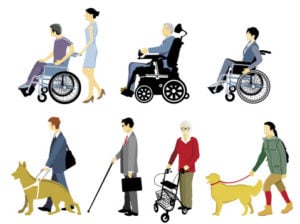
In the past, Florida residents with disabilities were largely separated from productive life. Many of them were effectively segregated in institutional settings. In recent decades, disabled people and their advocates have made substantial progress in elevating disability rights and increasing workplace opportunities for many people experiencing a range of mental or physical disabilities. The passage of the Americans with Disabilities Act marked a shift in how society treated disabled people. Accessibility, autonomy and leadership are the primary principles that have shaped laws meant to address disability discrimination.
Accessibility
Rules that redesigned physical spaces have advanced the rights of the disabled. Accessibility removed barriers that kept disabled people largely confined to their homes. Without accessibility, spaces were automatically discriminatory and kept disabled people from even thinking about employment. Despite legal recognition of the right to accessibility, disability remains a barrier to employment in many cases alongside other forms of discrimination.
Autonomy
For a long time, society focused on sheltering and controlling disabled people without regard to their wishes. Today, disability rights advocates promote autonomy as the guiding principle. Although disabled people largely need assistance in some areas of life, policies should elevate their personal freedom, choice and dignity.
Leadership
Disabled people understand their challenges and desires more than abled people. For this reason, their views and opinions should take priority over what people outside the disabled community think or believe.
As a person with disabilities, you may feel misunderstood, especially when you try to overcome your personal challenges. Misunderstanding can shift into mistreatment that violates your legal rights. A legal perspective could help you decide your next steps after an employer or potential employer dismisses your request for a reasonable accommodation that would empower you to perform a job.



